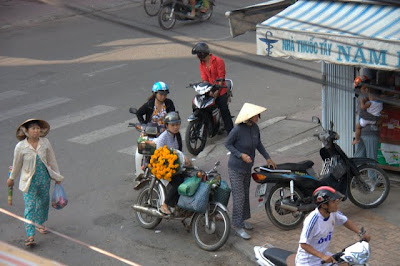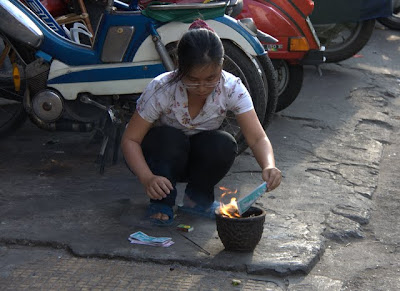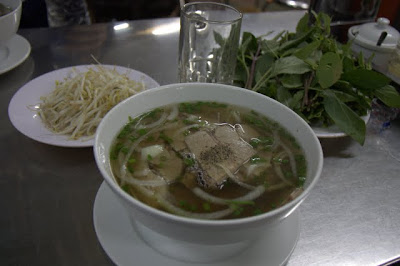It’s Always Sunny in Vietnam
Frank: Hey gang, what’s the action?
Dennis: What’s going on here?
Frank: Asians love gambling!
Sweet Dee: You know these guys?
Frank: Yeah, from Nam.
Mac: You were in Vietnam?
Dennis: Don’t get excited Mac, he was in Vietnam ten years ago on a business trip.
Frank: Beautiful country.
Chuc Mung Nam Moi!
When we realized we’d be in Vietnam smack dab during the middle of Tet, the Vietnamese New Year, I got a little concerned. Posters on forums warned the cities would be empty, hotels and restaurants would be closed, and everyone would be celebrating at home with their families. But just like our travels during Changwon in South Korea and Diwali in India, these dire predictions are way overblown. We had no trouble getting around during Tet. In fact, there were more buses available. While some restaurants were closed for the days before and after Tet, plenty of others were available. Hotels were open in the Mekong Delta and Saigon. About the only drawback was that the Floating Markets were closed on Tet itself, which unfortunately was the only day we had available to take a tour of the Delta. This meant no one was on the river and since most of the tour was on the big open industrial river instead of the quaint backwaters, our tour was so boring I actually fell asleep.
Any drawbacks were overshadowed by the feeling that we were experiencing a little taste of Vietnamese culture we wouldn’t have been able to see otherwise. Anticipation and excitement hung heavy in the air. From our first day in the country, we could tell a major celebration was just around the corner. Across all of the Delta towns, people zoomed by on scooters with armfuls of flowers or lucky kumquat trees towering in their baskets. Every home and business (and sometimes even parked cars) had an elaborate feast for the spirits set out front. In Vietnam, the spirits must be a little feisty, because we saw just as many cans of beer and packs of cigarettes as we did piles of fruit and traditional dishes. The smell of incense permeated the air, and red lanterns and flowers adorned shops and homes. In honor of Tet, we learned the phrase Chuc Mung Nam Moi! and used it often. We were greeted with either confused looks, making us think we were probably saying it wrong as we often do when we attempt phrases in different languages, or smiles followed by a hearty Chuc Mung Nam Moi in return. We celebrated Tet Eve in Can Tho by watching fireworks amongst a sea of teenagers and scooters. I really think we were two of twenty people over thirty and two of five white people. The fireworks were an elaborate display. Most were met with oohs and aahs or snickers and fake enthusiasm (the latter from a group of smartass teenagers nearby). The sheer number of people gave us our first taste of the raw energy that permeates the country.
When we got to Saigon, we found the main streets ablaze with lights and flowers in full celebration. We stumbled upon a parade in honor of Tet and posed by enormous light creations like the Vietnamese. In the streets surrounding our hotel, we watched people burn fake money in the street in the hopes of getting rich in the new year. I do suspect that Saigon was a bit toned down in the days after Tet. Each day we noticed increasing traffic and people infiltrate the city, and shops that were closed began to open. But we were able to see and do everything we wanted to see and do, and even a toned down Saigon is still an exciting Saigon.
So if your travel plans put you in a country during a major holiday, definitely embrace the opportunity!
Vietnam: Introduction.
Vietnam. Yet another name of a destination that is synonymous with a thing instead of the place. Out of all of the Southeast Asian countries we visited, Vietnam was the most unique. Going from Thailand to Laos to Cambodia revealed subtle differences, but other than the glaring disparity of socioeconomics the similarities stood out the most. In Vietnam, we noticed the differences right away.
Vietnam is a country that moves FAST. Upon arrival, we, and our backpacks, were whisked from the Cambodia/Vietnam border into the town of Ha Tien on the back of motorbikes (even though we thought we had booked a bus for the whole way and had decided we weren’t going to ride on motorbike taxis, which turned out to be a ludicrous thought if you want to get anywhere in Vietnam). And that’s pretty much how the next month went. You find yourself swept along with Vietnam’s swift current, distracted by the constant happenings that Vietnam presents on a daily basis, until suddenly you’d been there a month and Vietnam’s constant background hum had built itself up into a roaring crescendo without you noticing.
Some people find Vietnam difficult to travel through, saying that it’s noisy, that it’s hectic, that the people are conniving and trying to scam you. If Vietnam was difficult while we were traveling, we didn’t notice – we were too distracted by Vietnam’s zany atmosphere – but at the end of the month when we’d landed in our last destination, Hanoi, we realized that we were exhausted. Exhausted from listening to Vietnam’s constant soundtrack of beeps, revs, chatter, and invitations to buy something; exhausted from saying no over and over and over; exhausted from the constant obstacle course of trying to walk down the street past the street vendors and scooters crowding out the sidewalks and constant traffic crowding out the streets.
Despite being a socialist country, everything resembles capitalism to the max, meaning everyone’s trying to make a dong or two in any way they know how, which does tend to keep you on your toes a bit. But no one ever tried to scam us. The only signs of communism are the giant towering statutes of Uncle Ho in every town, the cicles depicted on flags on many streets, the censoring of information by the government (the nerve of the commies to block Facebook!), and the extreme one-sided views presented in government owned museums. Otherwise, everyone’s try to sell everyone else something, whether it’s food, souvenirs, tours, or transport. Vietnam’s at once old-fashioned and modern, with street vendors selling the same pho they’ve sold for years on the corner outside a trendy coffee shop selling iced coffees (with condensed milk, of course). Women actually wear the iconic conical hats while carrying double baskets of flowers or fruit over their shoulders in the cities or while tending to rice in the fields, but at the same time, Vietnam is filled to the brim with young people donning trendy Asian hair cuts, tightly cut stonewash jeans, and name brand attire, with the women in heels.
Coming from Cambodia, Vietnam’s development was a bit of a shock. Wi-fi came standard in most budget hotel rooms, along with hot water, a/c, (relatively) comfortable beds, mini-fridges, and satellite television. We stopped asking if the shower had hot water after two separate hotel clerks gave us looks that translated as yes, duh. I’ve heard it’s a remnant of the war, but Vietnam’s thoroughfares between cities are actual highways. In some ways, Vietnam reminded us of Japan. I expected both countries to be very rural, but there’s just not enough room in either. So Vietnam’s rice paddies butt up against industrial factories and cities, with every inch of space used for something. While Japan’s quiet order tones down the effect of the crowds, Vietnam’s chaos amplifies the effect of having people everywhere, all moving in different directions. In that respect, Vietnam reminded us of India. There’s life in every direction to watch at all times. Everyone’s love of the horn thrust us right back into memories (nightmares?) of the Indian streets.
If you added up the word I used most frequently in Vietnam, the winner would be no by a landslide. No I don’t want to take a tour, no I don’t want to buy your fruit, no I don’t want to take your picture (because I know you’ll ask for money), no I don’t want something tailored, no I don’t want to stay at your hotel, no I don’t want to buy a silk scarf, no I don’t want a cyclo ride, no, no, no, no. Unfortunately, someone taught the Vietnamese how to say, Hello, you buy something? in English instead of, oh I don’t know, Hello, how are you? Would you like to come look around my shop? or even Would you like to buy something, please?
Compared to the sunny disposition of most Thais or even the Cambodians, who sure don’t shy away from asking you if you want to buy something, the Vietnamese sales presentations could use a tune-up. Especially in touristy cities like Hoi An, all you hear when walking down the street is vendor after vendor shouting at you, You buy something? Hello, you buy something? Ma’am, buy something! No one’s original. We alternated between a polite no thank you and pretending we were deaf, but sometimes the Vietnamese can get feisty if you don’t want to buy their product or service. In Saigon, we sat at sidewalk tables drinking a beer, which, in retrospect, I’d highly advise against, because there’s a constant stream of street hawkers propositioning you to buy their wares. (Although come to think of it, going inside offers you no respite; Vietnamese shop owners aren’t bothered by other vendors coming in to pester you there, either). I watched a sassy little girl, no more than ten, get into an argument with her little brother for selling in her territory. Shortly thereafter, I saw her giving the hard sell to three Westerners sitting next to us. Unlike the Cambodian children, who give you a sob story as a sales tactic, this little girl punched one of the guys in the arm after he told her no, he didn’t want to buy her gum. We never got punched by minors, but we walked into a Saigon market and walked back out after being physically grabbed and pulled if we didn’t stop and look at every market stall.
In addition to being relentless in their approach, the Vietnamese often are inquisitive, which does have the unfortunate side effect of making you suspicious of those who are being innocently friendly. As in India, everyone wants to know where you’re from and how long you’ve been here (to judge how much money you have and how much of a sucker you are). But in Vietnam, many people want to know everything else too so they can figure out what they can sell you. Every time we checked out from a hotel, they want to know where we were going next. Inquiring about the public bus schedule? Well, the hotel has a van you should use. In Hue, near the end of our time in Vietnam, I asked the clerk at the front desk of our hotel where I could find a corner market. She gave me directions to one down the street and then quizzed me on what I planned to buy. Whether she was trying to see if the hotel could sell me what I wanted or whether she was just being nosy, I don’t know, but I wanted to scream, it’s none of your business!
But as I mentioned at the beginning, our frustrations with Vietnam were gradual. Perhaps it was because nothing compares to India, perhaps it was because we were wise old travelers on month 11, perhaps it was because we traveled south to north (conventional wisdom saying that the north is more intense). Whatever it was, during our month in the country, we were busy turning Vietnam from an event into a place. We were eating the pho and bun and spring rolls like it was our job; stalking red dragonfruit in every market; celebrating Tet with Vietnamese teens; looking at the Vietnam War from another perspective; zipping through the countryside on the back of motorcycles; lounging at the beach; getting a custom wardrobe made; meeting sweet, helpful Vietnamese people; worrying about our boat sinking; and oogling everything happening all around us. Vietnam is fun, alive, and interesting; the best way is to dive in and be surrounded.





















